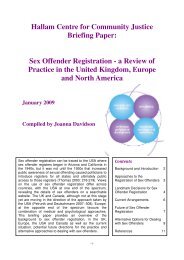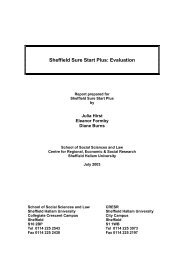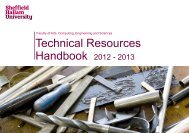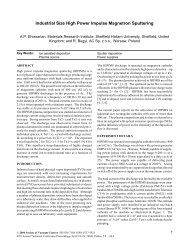The exercise of judicial discretion in rent arrears cases - Sheffield ...
The exercise of judicial discretion in rent arrears cases - Sheffield ...
The exercise of judicial discretion in rent arrears cases - Sheffield ...
You also want an ePaper? Increase the reach of your titles
YUMPU automatically turns print PDFs into web optimized ePapers that Google loves.
“I wouldn’t dream <strong>of</strong> mak<strong>in</strong>g an order...without be<strong>in</strong>g really certa<strong>in</strong> that the person<br />
that I was mak<strong>in</strong>g the order, one <strong>of</strong> the parties understood it entirely.” (DJ E)<br />
Others placed emphasis on their need to understand the particular circumstances <strong>of</strong> the<br />
defendant and stated they could not make an order unless they were clear what the<br />
defendant said:<br />
“Well I certa<strong>in</strong>ly wouldn’t then make an order if I wasn’t satisfied that she hadn’t been<br />
able to get across what she wanted to say. I’d probably have to adjourn it, and… I’d<br />
probably ask her to see one <strong>of</strong> the advisers so that they could then try and arrange<br />
appropriate <strong>in</strong>terpreters to come aga<strong>in</strong> on another occasion, simply adjourn it without<br />
mak<strong>in</strong>g any terms or anyth<strong>in</strong>g at that stage.” (DJ R)<br />
A few judges felt the need to test whether the defendant genu<strong>in</strong>ely could not understand the<br />
process. For example, one judge stated that he would give a short adjournment to:<br />
“see whether they understood what I’m say<strong>in</strong>g or not, because they <strong>of</strong>ten…usually<br />
they give themselves away if they are conn<strong>in</strong>g. (pause) I would adjourn for a very<br />
short period <strong>of</strong> time, fourteen days at the most for her to provide pro<strong>of</strong>.” (DJ D)<br />
In general judges were concerned to ensure that defendants who are not fluent <strong>in</strong> English<br />
should access appropriate <strong>in</strong>terpret<strong>in</strong>g services. Mixed views were recorded however, as to<br />
who should be responsible for the provision <strong>of</strong> such services. In 1997 the Court Service was<br />
<strong>in</strong>strumental <strong>in</strong> creat<strong>in</strong>g the National Register <strong>of</strong> Public Services Interpreters (NRPSI) by the<br />
Institute <strong>of</strong> L<strong>in</strong>guists. <strong>The</strong> pr<strong>in</strong>ciple is that every <strong>in</strong>terpreter work<strong>in</strong>g <strong>in</strong> the courts should be<br />
selected from this Register, or the CACDP Directory <strong>in</strong> the case <strong>of</strong> deaf people, and these<br />
registers are used frequently by Crown Courts. However, before the county court will pay for<br />
a registered <strong>in</strong>terpreter <strong>in</strong> a civil case, all other possibilities must first be exhausted. This<br />
means <strong>in</strong> practice that <strong>in</strong>terpreters are <strong>of</strong>ten paid provided by landlords, advice centres<br />
and/or Duty Desk Schemes, by members <strong>of</strong> court staff, or (with approval by the judge) by a<br />
friend or family member.<br />
Judges’ comments on who should be responsible for the provision <strong>of</strong> <strong>in</strong>terpreters reflected<br />
the need to explore practical alternatives to employ<strong>in</strong>g the services <strong>of</strong> a member <strong>of</strong> the<br />
NRPSI. Indeed only one <strong>of</strong> the judges even referred to the possibility <strong>of</strong> the court provid<strong>in</strong>g<br />
such a service stat<strong>in</strong>g:<br />
“I’d be quite concerned to f<strong>in</strong>d out and if necessary I’d go and ask the court manager<br />
about gett<strong>in</strong>g an <strong>in</strong>terpreter for her, I mean if it was that bad…and she wasn’t go<strong>in</strong>g<br />
to be represented.” (DJ Y)<br />
More commonly judges sought to resolve the problem by rely<strong>in</strong>g on the claimant:<br />
“I have made orders for the claimant to provide an <strong>in</strong>terpreter if it seems difficult. I<br />
don't do it <strong>of</strong>ten, but I have done it, particularly aga<strong>in</strong>st local authorities and hous<strong>in</strong>g<br />
landlords.” (DJ Q)<br />
66
















